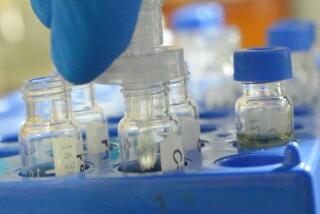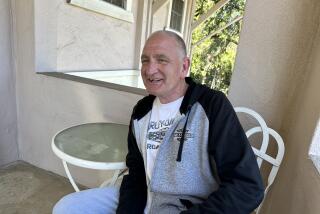Industry Tries to Cash In on Drunk Driver Crackdown
- Share via
Like many restaurant and bar owners, John Faber is worried about people who drink and drive, and he is thinking of attacking the problem with a small plastic tube.
Faber is considering distributing a disposable alcohol detector called BreathScan to befuddled patrons. Those who flunk the test would be pressured to take a free taxi ride home sponsored by liquor companies in Long Beach.
“I think it’s a pretty good idea,” said Faber, who owns McKenna’s Creek restaurant in Long Beach and Chicago Joe’s in Irvine as well as the Fiddlers Three coffee shop chain. “We’re trying everything in the world to get the guy home safely.”
Think of the possibilities: You go to a party, down a few beers and decide to leave. You pull a tube out of your pocket and blow into it.
If the crystals inside the tube remain yellow, you pull out the car keys. If the crystals turn green, you call a cab.
That’s a scene that small companies in Colorado and California are hoping will become more common as law enforcement agencies continue to crack down on drinking drivers.
Prescott Technologies of Denver is trying to cash in on growing public concern about drinking and driving by selling the BreathScan disposable alcohol detector that consumers can use to test themselves. Luckey Laboratories of San Bernardino makes a similar device that has been distributed to consumers only occasionally.
Prescott intends to sell BreathScan in supermarkets, drugstores and even some liquor stores nationwide, said Sydonia Poenisch, director of sales and marketing. The small device, which Prescott has just begun distributing to stores, will sell for less than $2, she said.
The company has been selling BreathScan to corporations for several months. It contends that in one test, BreathScan scored an accuracy rate of 98%.
“The way the laws are going . . . it’s much easier to test yourself than to spend a few thousand dollars on attorney fees and lose your license” after an arrest for driving while under the influence of alcohol, Poenisch said. “It’s going to be a very large market.”
The BreathScan is a thin plastic tube, nearly three inches long. The user breaks a glass vial inside that is filled with yellow crystals and then blows into the tube. If within three minutes the crystals become completely blue-green, the tester’s blood-alcohol level is more than 0.10%.
In California, a motorist with a 0.10% blood-alcohol reading is considered to be legally drunk.
More than half of the 45,700 deaths from traffic accidents last year involved alcohol, “which is a shameful number in this country,” a spokesman for the National Safety Council said. The National Highway Traffic Safety Administration estimated the number of alcohol-related deaths at 22,360 last year, down from 23,760 in 1984.
The battle against drunk drivers has produced all sorts of products, from alcohol-sniffing flashlights to machines that hook into a car’s ignition and won’t allow the car to start if the driver’s blood-alcohol level is too high. So far, most haven’t been sold aggressively to consumers.
In the past, Mothers Against Drunk Drivers has supported some of these devices but has expressed concern that some drinkers will drive despite warnings, and therefore society’s attitudes toward drinking and driving must change.
In San Bernardino, Luckey Laboratories has been making a disposable alcohol detector, called “The 15-Second Driver’s Test,” for about 20 years but has never sold it directly to the public, owner Manley Luckey said. Instead, the company has sold it to industry and police departments. Only occasionally has Luckey Laboratories supplied the tests to various companies that have used them for special promotions, often around Christmas or the Fourth of July, Luckey said.
The most successful of the promotions came in December, 1983, when an East Coast grocery store chain and television and radio stations distributed 250,000 alcohol detectors, Luckey said. Business grew during the next year but then dropped off, primarily because several faulty detectors made by other manufacturers found their way to the market, he said.
“That was a good year; I really thought it would keep going,” Luckey said. “It kind of started out with a bang and slowed down, and now it’s moving along more routinely.”
Most of the demand for the disposable tests comes from corporations, bars and restaurants and, of course, law enforcement agencies, he said. Luckey Laboratories makes about two dozen types of alcohol detectors, from the disposable test, which can’t be used as evidence in court, to very sophisticated models sold to laboratories and police departments.
Need for the Devices
“As long as people are going to consume alcohol, there’s going to be the need for a device to detect it,” Luckey said. Luckey Laboratories has annual sales of between $1 million and $2 million, Luckey said, adding that “we have a modest gain each year.”
Although Luckey is interested in the consumer market, he isn’t entirely sure that the public is willing to police itself with such devices. “People aren’t all that serious about testing themselves yet,” Luckey said. “It doesn’t seem like people would go out of their way to buy it. It may be (that) as time goes by and laws get stricter, they will go out and buy them.”
National Draeger Co. of Pittsburgh, whose Breathalyzer machines are found in police stations across the nation, also makes a disposable test that isn’t sold to the public.
Any consumer demand for disposable detectors “would probably be a fad-type thing--maybe if you’re at a party and you want to see if you’re intoxicated or not,” said Tony Keller, an information analyst with National Draeger. “I think it would be for kicks.”
More to Read
Inside the business of entertainment
The Wide Shot brings you news, analysis and insights on everything from streaming wars to production — and what it all means for the future.
You may occasionally receive promotional content from the Los Angeles Times.










